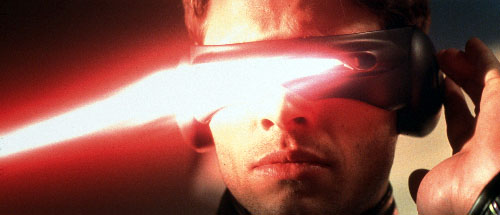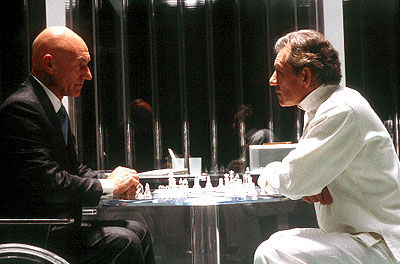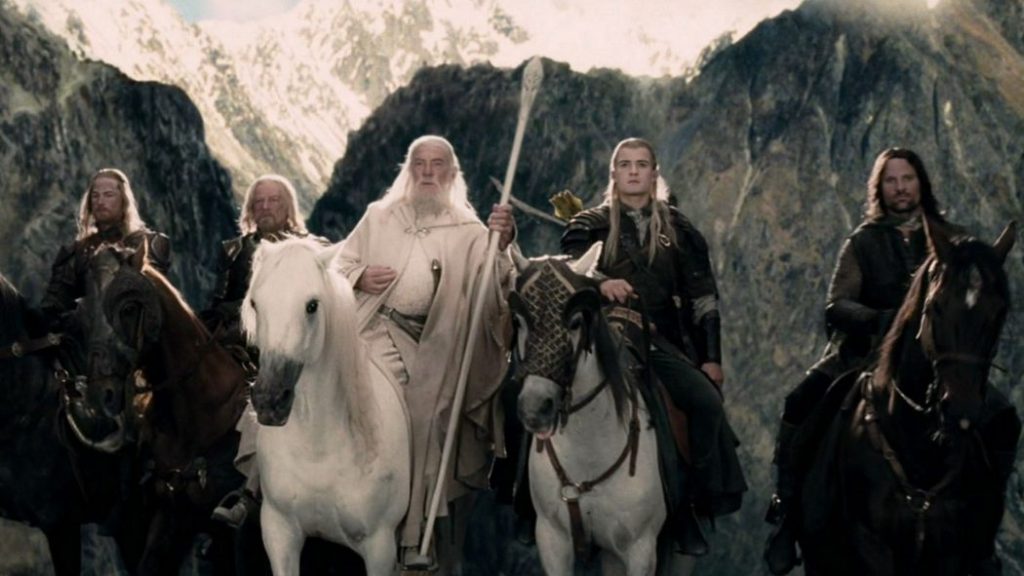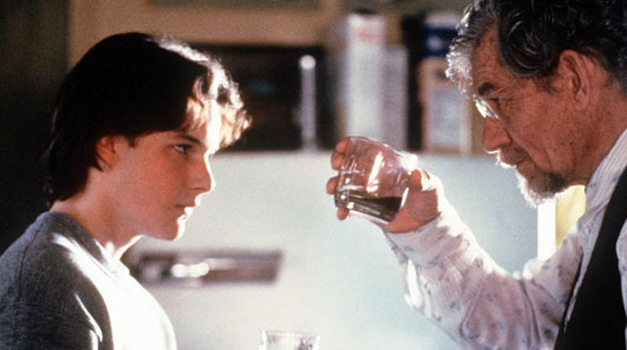The Hobbit: An Unexpected Journey (2012)
DIRECTOR: Peter Jackson
CAST:
Martin Freeman, Ian McKellen, Richard Armitage, Andy Serkis, Cate Blanchett, Hugo Weaving, Christopher Lee, Ian Holm, Elijah Wood
REVIEW:
A decade ago, Peter Jackson took us to Middle Earth and raised epic fantasy adventure to a high bar that all that followed in its wake would be hard-pressed to equal, let alone surpass. Ironically but probably inevitably, Jackson himself has fallen short of that herculean task with the first installment of the prequel trilogy, but while The Hobbit: An Unexpected Journey is not as consistently enthralling as The Lord of the Rings, it is still an enjoyable adventure worth going on. Continue reading
X-Men 3: The Last Stand (2006)
DIRECTOR: Brett Ratner
CAST:
Hugh Jackman, Patrick Stewart, Sir Ian McKellen, Famke Janssen, Halle Berry, Kelsey Grammer, Anna Paquin, James Marsden, Shawn Ashmore, Aaron Stanford, Rebecca Romijn, Ellen Page, Ben Foster, Vinnie Jones, Josef Sommer, Bill Duke
REVIEW:
X-Men 3: The Last Stand, the third installment of the original X-Men trilogy, is a mixed bag that veers from some of the best scenes in the series to a misjudged mess that desecrates some key characters and is crammed with more material than it can handle. Continue reading
The Da Vinci Code (2006)
DIRECTOR: Ron Howard
CAST:
Tom Hanks, Audrey Tautou, Ian McKellen, Jean Reno, Paul Bettany, Alfred Molina, Jürgen Prochnow
REVIEW:
Ron Howard’s film adaptation of Dan Brown’s novel The Da Vinci Code was preceded by an extraordinary amount of controversy over certain of its plot points which seemed to take on a life of its own, raising the movie and the theological and historical questions it raised into something greater than the film itself. Continue reading
X2: X-Men United (2003)
DIRECTOR: Bryan Singer
CAST:
Hugh Jackman, Patrick Stewart, Ian McKellen, Anna Paquin, Famke Janssen, Halle Berry, James Marsden, Alan Cumming, Brian Cox, Rebecca Romijn, Bruce Davison, Kelly Hu, Shawn Ashmore, Aaron Stanford
REVIEW:
With the success of 2000’s X-Men, director Bryan Singer and cast and crew were free in this sequel to move forward without the necessary exposition and character introduction which took a large chunk of the first film. The result supplies a faster pace and a little more ambition, along with an even heavier helping of the original’s underlying social commentary. Fans of the first should be pleased by the second. Continue reading
The Lord of the Rings: The Two Towers (2002)
CAST: Elijah Wood, Ian McKellen, Viggo Mortensen, Liv Tyler, Sean Astin, John Rhys-Davies, Bernard Hill, Christopher Lee, Billy Boyd, Dominic Monaghan, Orlando Bloom, Miranda Otto, David Wenham, Karl Urban, Brad Dourif, Hugo Weaving, Cate Blanchett, Andy Serkis
REVIEW:
New Zealand director Peter Jackson and New Line Cinema took a big risk with 2001’s The Fellowship of the Ring, the first installment of their colossal film adaptation of J.R.R. Tolkien’s trilogy The Lord of the Rings. Fortunately, not only did The Fellowship of the Ring pay off, it went on to become one of the biggest box office smashes in recent history and one of the most acclaimed motion pictures of the year, winning four Academy Awards (though not the coveted Best Picture) and setting a new standard for epic fantasy adventure. But therein lay a new danger. With the first film being deservedly acclaimed, what if the second didn’t live up to the now high expectations? The first installment was one of the great films of 2001 or any other year, but even the most enthusiastic viewers had room for some doubt. This would not be the first time a solid film was followed by an inferior sequel. The Two Towers would also have the unenviable position of providing the middle act, advancing events from the first movie while leading into the third, incomplete on its own. Fortunately, if it’s not quite as flawless a film as The Fellowship of the Ring, The Two Towers is no slouch, continuing to paint on an epic, immersive, and enthralling canvas, and builds to one of the most tremendous battle scenes yet committed to film. Continue reading
The Lord of the Rings: The Fellowship of the Ring (2001)
CAST: Elijah Wood, Ian McKellen, Viggo Mortensen, Sean Astin, Sean Bean, Liv Tyler, Cate Blanchett, John Rhys-Davies, Billy Boyd, Dominic Monaghan, Orlando Bloom, Christopher Lee, Ian Holm, Hugo Weaving, Andy Serkis
REVIEW:
The origins of this epic film trilogy date back to the early 1930s, when a British scholar named J.R.R. Tolkien began writing an equally epic series of books. The first to be completed and published was The Hobbit in 1937, but Tolkien had a more ambitious story in mind. Originally setting out to write one enormous novel, he ultimately realized that such a tale as he was spinning was too vast to be contained in one book, and instead formed it into a trilogy. Parts one and two, The Fellowship of the Ring and The Two Towers, were released in 1954, followed by the climax, The Return of the King, in 1957. Together, the trilogy was known as The Lord of the Rings. The significance of this fantasy series cannot be understated. Tolkien’s books were adored by millions the world over during his time, and since his death in 1973, they have remained a beloved and integral part of the fantasy literature genre. With such a following, it was inevitable that film versions would at least be attempted, but few filmmakers had either the inclination or the means to tackle such a daunting production. Mediocre animated versions of both The Lord of the Rings and its prequel The Hobbit were made—and flopped—in the 1970s, with the poor quality of the animation and various story omissions rankling fans. Two more decades passed, and finally New Zealand director Peter Jackson has taken on the ambitious task of bringing Tolkien’s epic trilogy to the big screen with the backing of New Line Cinema’s investment of nearly $300 million for the package deal of all three installments. Those worried about whether it is even possible to translate The Lord of the Rings intact to the screen can breathe a sigh of relief, at least if this first installment is any indication. Jackson and his cast and crew have succeeded on every level, and the result is not only a definitive film adaptation of part one of one of the most popular fantasy stories ever written, not only a majestic, enthralling adventure in its own right, but itself a pinnacle in filmmaking, one of the most colossal film productions ever made, and raising the meaning of “epic filmmaking” to a whole new level. In the future all epic fantasy adventures—including its own sequels—will have a high bar to hurdle. Continue reading
X-Men (2000)
DIRECTOR: Bryan Singer
CAST:
Hugh Jackman, Patrick Stewart, Ian McKellen, Anna Paquin, Halle Berry, Famke Janssen, James Marsden, Bruce Davison, Ray Park, Rebecca Romijn, Tyler Mane
REVIEW:
Since the X-Men comic book series was first introduced in the 1960s, it has been one of Marvel Comics’ most consistently popular titles. It had already been an animated television series, and it was inevitable that it would be made into a feature film sooner or later. Now that it has been done, its loyal fans are probably a little divided over it. Some will appreciate writer-director Bryan Singer’s faithfulness to the source material and his serious effort to transfer it from page to screen as intact as possible. But with any large following, it is impossible to please everyone, with the most minor alterations leaving some outraged. Personally, as someone who collected X-Men comics when younger, I approve of Singer’s respect for the mythos and characters, but it’s been too long since I’ve read the comics to even know most of what was changed or left out, and in any case it doesn’t bother me. A comic book series which carries on for decades and thus can include endless complex interweaving plotlines and a vast array of characters and a two-hour movie are different mediums. Singer keeps things simple and straightforward; one doesn’t need familiarity with the source material to understand and enjoy the film. X-Men is essentially comic book action-adventure fantasy escapism, but an embedded social message about overcoming fear and hatred lends it a touch of depth beyond just a summer action flick.
 The premise is that mankind has begun evolving into mutants with superhuman powers which cannot be explained or understood by the average person, and as such are largely feared and even hated. And among the mutants, battle lines have been drawn between two ideologically opposed groups. One is led by the psychic Professor Charles Xavier (the commanding Patrick Stewart, who even looks like the comic book character), who runs a school for ‘gifted students’ in New York, actually a place where mutant children can come and be taught to hone their powers in an accepting and encouraging environment. Xavier has hopes that mankind will come to accept mutants in time, and also uses the school as a cover for the secret base where he and his team of likeminded mutants try to counter the other, less benevolent group led by Xavier’s old friend Erik Lensherr/Magneto (Sir Ian McKellen). Embittered by his childhood experiences in Nazi concentration camps, Erik/Magneto has no faith in humanity and has come to view himself as superior to them. His disgust for mankind’s bigotry is only reinforced by the McCarthy-esque Senator Kelley (Bruce Davison), who incites fear of mutants and is pushing discriminatory legislation. Xavier’s team is made up of the telepathic Jean Grey (Famke Janssen), Cyclops (James Marsden), who shoots laser blasts from his eyes, and weather-controlling Storm (Halle Berry in a white wig). Newcomers to the group are Rogue (Anna Paquin), who drains the life force—and absorbs the powers—of anyone she touches with her bare skin, and the mysterious Wolverine (buffed-up Aussie newcomer Hugh Jackman, whose accent slips once or twice). Wolverine gets the most screentime of anyone, and has the most shadowy back-story; obviously the victim of extensive and horrific experimentation, he has had an indestructible metal grafted onto his entire skeleton, giving him the ability to grow metal spikes out of his hands. Magneto’s group includes the shape-shifting Mystique (an unrecognizable Rebecca Romijn), Toad (Ray Park, best-known as Darth Maul in Star Wars Episode I: The Phantom Menace) who has a nasty way with his tongue, and the hulking Sabertooth (professional wrestler Tyler Mane)…and they’re up to something. The loner Wolverine and the teenage runaway Rogue must decide whether to embrace Xavier’s offer of help—and his cause—or continue on their own.
The premise is that mankind has begun evolving into mutants with superhuman powers which cannot be explained or understood by the average person, and as such are largely feared and even hated. And among the mutants, battle lines have been drawn between two ideologically opposed groups. One is led by the psychic Professor Charles Xavier (the commanding Patrick Stewart, who even looks like the comic book character), who runs a school for ‘gifted students’ in New York, actually a place where mutant children can come and be taught to hone their powers in an accepting and encouraging environment. Xavier has hopes that mankind will come to accept mutants in time, and also uses the school as a cover for the secret base where he and his team of likeminded mutants try to counter the other, less benevolent group led by Xavier’s old friend Erik Lensherr/Magneto (Sir Ian McKellen). Embittered by his childhood experiences in Nazi concentration camps, Erik/Magneto has no faith in humanity and has come to view himself as superior to them. His disgust for mankind’s bigotry is only reinforced by the McCarthy-esque Senator Kelley (Bruce Davison), who incites fear of mutants and is pushing discriminatory legislation. Xavier’s team is made up of the telepathic Jean Grey (Famke Janssen), Cyclops (James Marsden), who shoots laser blasts from his eyes, and weather-controlling Storm (Halle Berry in a white wig). Newcomers to the group are Rogue (Anna Paquin), who drains the life force—and absorbs the powers—of anyone she touches with her bare skin, and the mysterious Wolverine (buffed-up Aussie newcomer Hugh Jackman, whose accent slips once or twice). Wolverine gets the most screentime of anyone, and has the most shadowy back-story; obviously the victim of extensive and horrific experimentation, he has had an indestructible metal grafted onto his entire skeleton, giving him the ability to grow metal spikes out of his hands. Magneto’s group includes the shape-shifting Mystique (an unrecognizable Rebecca Romijn), Toad (Ray Park, best-known as Darth Maul in Star Wars Episode I: The Phantom Menace) who has a nasty way with his tongue, and the hulking Sabertooth (professional wrestler Tyler Mane)…and they’re up to something. The loner Wolverine and the teenage runaway Rogue must decide whether to embrace Xavier’s offer of help—and his cause—or continue on their own.
X-Men should please most fans by showing off each character’s powers, but has received some criticism for focusing more on Wolverine, Magneto, and Rogue than anyone else. That may be a legitimate criticism (although the above three are a lso for my money the most three-dimensional and compelling characters), but it already has a large cast of characters and focusing on all of them equally would bog the movie down. As it is, it already spends almost half its running time on exposition and character introduction and development, which for the introductory outing may have been a necessary evil. With special effects-heavy action sequences and an undercurrent of humor, it is likely to entertain most theatergoers, and keeps the characters, their powers, and the plot easy to keep track of. X-Men’s tone, while occasionally hitting a surprisingly poignant moment, is fairly lightweight, and it focuses more on the origin aspect than the plot, which leads to an action-packed climax but keeps fairly modest goals. X-Men doesn’t aspire for the epic, and it lacks the ambition and scope of Superman, but it’s entertaining and fulfills what it sets out to accomplish. All of the actors do well enough in their roles, especially Ian McKellen, Hugh Jackman, Anna Paquin, and Patrick Stewart, but the others are not given too much to do.
lso for my money the most three-dimensional and compelling characters), but it already has a large cast of characters and focusing on all of them equally would bog the movie down. As it is, it already spends almost half its running time on exposition and character introduction and development, which for the introductory outing may have been a necessary evil. With special effects-heavy action sequences and an undercurrent of humor, it is likely to entertain most theatergoers, and keeps the characters, their powers, and the plot easy to keep track of. X-Men’s tone, while occasionally hitting a surprisingly poignant moment, is fairly lightweight, and it focuses more on the origin aspect than the plot, which leads to an action-packed climax but keeps fairly modest goals. X-Men doesn’t aspire for the epic, and it lacks the ambition and scope of Superman, but it’s entertaining and fulfills what it sets out to accomplish. All of the actors do well enough in their roles, especially Ian McKellen, Hugh Jackman, Anna Paquin, and Patrick Stewart, but the others are not given too much to do.
 A few qualities raise X-Men above mere comic book escapism. One is the casting of Patrick Stewart and Ian McKellen, whose commanding and dignified presences bring a touch of class and grant the movie a little needed gravitas. Another, probably most significantly, is the underlying theme of tolerance and accepting differences which runs throughout the movie, never too overt or preachy to interfere with the action sequences and special effects, but never far under the surface either. The big brother-little sister type bond between the gruff but ultimately humane Wolverine and the lonely and alienated Rogue has a touch of depth, and Anna Paquin effectively projects the pain and loneliness of being cast out from society for being different. Hugh Jackman, an Aussie unknown in the States, is likely to launch himself into budding heartthrob status and embodies some trademarks of the comic character (he chomps on cigars and says “bub”). Jackman has the charisma to be as close to a main “star” as we have, though he’s also given the most central attention. Thus, while X-Men can simply be enjoyed for the action-adventure escapism it is, it, like the comic series, is fundamentally an allegory for the struggles of minorities facing discrimination and hatred, and the symbolism, both on the page and the screen, isn’t hard to see. Also adding complexity is the fact that while Magneto’s plan might be a little silly (it involves building a machine to transform all the world leaders gathered for a summit on Ellis Island into mutants) Magneto himself is not quite your standard issue comic book megalomaniac. He is a bitter and cynical man who has lived through the horrifying levels intolerance can reach and is resorting to extreme measures to protect himself and his people, and McKellen and the filmmakers portray Magneto as more misguided than evil, and more three-dimensional than the villains we typically expect to see in comic book movies.
A few qualities raise X-Men above mere comic book escapism. One is the casting of Patrick Stewart and Ian McKellen, whose commanding and dignified presences bring a touch of class and grant the movie a little needed gravitas. Another, probably most significantly, is the underlying theme of tolerance and accepting differences which runs throughout the movie, never too overt or preachy to interfere with the action sequences and special effects, but never far under the surface either. The big brother-little sister type bond between the gruff but ultimately humane Wolverine and the lonely and alienated Rogue has a touch of depth, and Anna Paquin effectively projects the pain and loneliness of being cast out from society for being different. Hugh Jackman, an Aussie unknown in the States, is likely to launch himself into budding heartthrob status and embodies some trademarks of the comic character (he chomps on cigars and says “bub”). Jackman has the charisma to be as close to a main “star” as we have, though he’s also given the most central attention. Thus, while X-Men can simply be enjoyed for the action-adventure escapism it is, it, like the comic series, is fundamentally an allegory for the struggles of minorities facing discrimination and hatred, and the symbolism, both on the page and the screen, isn’t hard to see. Also adding complexity is the fact that while Magneto’s plan might be a little silly (it involves building a machine to transform all the world leaders gathered for a summit on Ellis Island into mutants) Magneto himself is not quite your standard issue comic book megalomaniac. He is a bitter and cynical man who has lived through the horrifying levels intolerance can reach and is resorting to extreme measures to protect himself and his people, and McKellen and the filmmakers portray Magneto as more misguided than evil, and more three-dimensional than the villains we typically expect to see in comic book movies.
X-Men’s maintaining of the comics’ emphasis on the plight of minorities is unsurprising considering that its young writer-director, Bryan Singer, who made a name for himself with 1995’s The Usual Suspects, is both Jewish and gay (Singer also directed the far darker and disturbing Apt Pupil, which also featured Ian McKellen and Bruce Davison). Both Singer and the also openly gay Sir Ian McKellen have commented in interviews that the mutants’ struggle for acceptance striking a chord with their own backgrounds was what attracted them to the film. If embedding a message of tolerance inside an action-packed summer flick will get more people to hear it, so be it, although many will likely only be dazzled by the special effects and action scenes and not read between the lines to get the underlying point. In any case, whether you see it as a call for tolerance or entertainment or both, X-Men serves as solid escapist fantasy with an underlying message of acceptance and understanding that’s as relevant today as ever.
***
Apt Pupil (1998)
CAST: Brad Renfro, Ian McKellen, Bruce Davison, David Schwimmer, Joshua Jackson, Ann Dowd, Elias Koteas, Michael Byrne, Joe Morton, Jan Triska
REVIEW:
WARNING: THIS REVIEW WILL REVEAL “SPOILERS”
Apt Pupil is a morbidly engrossing psychological thriller crafted with enough professionalism and ability to sometimes persuade us to overlook its questionable taste, even if the bad aftertaste lingers. An adaptation of a novella by Stephen King (a previous attempt at filming it was mounted in 1988, starring Ricky Schroder and Nicol Williamson, but fell through), it uses that ever-convenient go-to-guy of villains—Nazis—as a launching pad for a psychological character study. Those seeking a conventional “thriller” might be disappointed. Apt Pupil is disturbing, sometimes chilling, but the horror is not of the “boo!” variety. Apt Pupil is a slow-burn foray into the heart of darkness that resides within two seemingly very different men, and how they feed each other’s worst impulses. Continue reading


